As a powerlifting coach, I’m often asked if it’s worth wearing knee sleeves for squats, how they help, and how much additional weight one can expect to lift when wearing them. Here’s my response:
Knee sleeves can add anywhere from 10 lbs to 45 lbs to your squat; however, the amount of help that sleeves offer will depend on the quality of the sleeves, how thick the knee sleeves are, and how they are used.
In this article, I’ll explain the benefits of wearing knee sleeves for squats, the potential drawbacks, how to use them properly, and the different types available so that you can get the most out of your knee sleeves.
Key Takeaways
-
Knee sleeves can improve your squat directly using potential energy that provides a bounce out of the bottom position, and indirectly through compression and warmth.
- An upright squatter using 7mm knee sleeves made of neoprene can expect the largest increase in their squat from the use of knee sleeves.
-
Knee sleeves will not fix existing injuries or mask poor technique so it’s important to address these issues before wearing knee sleeves.
What Is A Knee Sleeve?
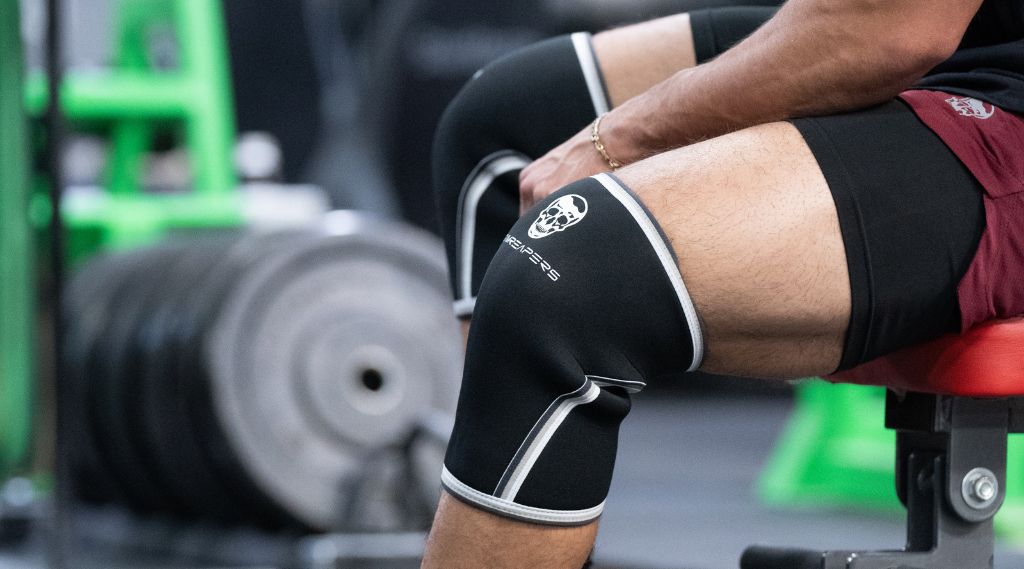
Knee sleeves are compression garments worn around the knee joint that can help reduce pain and inflammation, improve blood flow, and provide support during movement.
Knee sleeves were designed to be worn for lower body movements like squats but they are often worn for deadlifts and lower body accessories (i.e. lunges) as well.
Knee sleeves are available in 3mm, 5mm, and 7mm thicknesses, with the most popular being 5mm and 7mm sleeves made of neoprene.
Neoprene is a synthetic rubber material that is known for its elasticity and heat retention properties, making it a great option to keep your joints warm and provide support and stability to your joints through compression.
Related Article: Knee Sleeves for Deadlifts: Should You Wear Them? (Pros & Cons)
4 Reasons To Wear Knee Sleeves For Squats
The main benefits of wearing knee sleeves for squats are:
1. Joint Support
Knee sleeves can provide added support and stability to the knee joint during heavy squats, which helps reduce the risk of injury by keeping the knee joint in proper alignment and reducing the amount of stress placed on the joint.
This is particularly helpful for those who have had knee injuries, those who struggle to maintain proper technique, and those who lift heavier weights more frequently.
2. Increased Warmth
The compression and heat retention properties of knee sleeves, particularly those made of neoprene, can help increase blood flow and joint mobility, which can help reduce the risk of injury and improve overall squat performance.
Many lifters complain about their knees feeling very stiff and achy when squatting without knee sleeves, which is largely due to a lack of heat in the joint.
Wearing knee sleeves warms up your joints more quickly and keeps your joints warm between sets, which keeps your knee joints lubricated and minimizes friction.
3. Pain Reduction
Many lifters experience knee pain during squats, especially when lifting heavy weights. Knee sleeves can provide compression, warmth, and proprioceptive feedback (awareness of your positioning), which can help reduce pain and discomfort.
Naturally, if you are in pain you will not be able to lift as much weight or push yourself as hard to make progress. Knee sleeves may be able to help alleviate pain if your pain is caused by a lack of stability, friction in the joint, or unfavorable positions (i.e. knees caving in) that is remedied through the use of sleeves.
That said, there is a difference between pain and injury; if you have a knee injury then you should go see a physiotherapist to address the underlying issue, rather than using sleeves as a “band-aid solution”.
4. Performance Enhancement
Lifters may find that wearing knee sleeves can help them squat more weight because of the added support and stability provided by the sleeves, which can help increase confidence and reduce the risk of injury.
The degree to which sleeves can help improve your performance will vary based on how thick the knee sleeves are, the type of material they’re made from, and how upright you squat.
Thicker knee sleeves (7mm) made from neoprene will store more potential energy as you descend into the bottom position which can help provide a “bounce” out of the bottom position as you go to stand back up.
This bouncing effect can help you lift more weight by increasing your momentum out of the bottom position, which is where many lifters get stuck while squatting.
The last factor to consider for performance benefits is your squat position.
Those who squat in a more upright position will have more knee flexion than those who squat in a bent-over position.
The more knee flexion you have when squatting, the more you will stretch your knee sleeves out, the more potential energy you’ll store, and the better they will assist in getting you out of the bottom of your squat.
Lifters that are more bent over with less knee flexion could expect less performance enhancement with the use of knee sleeves.
Related Article: Should You Wear Knee Sleeves Over Leggings? 4 Considerations
How Much More Can You Squat Using Knee Sleeves?

A thinner 5mm knee sleeve could lead to you squatting 10-15 lbs more than normal simply because of the warmth they provide which may allow you to move better, but a 7mm sleeve can add 20-45 lbs to your squat.
Anecdotally, I have found that wearing knee sleeves can help lifters feel more confident and stable during heavy squats, which can lead to increases in the weight lifted.
However, research on the effectiveness of knee sleeves is limited.
Some studies have found that knee sleeves can provide a small increase in squat performance, while others have found no significant difference.
In this study on the use of knee sleeves during a one rep max back squat, vertical jump, and one rep max single leg extension, they found that the use of knee sleeves only made a difference in the back squat and had no significant difference in the other two movements.
Theoretically, the way a knee sleeve allows you to squat more is by acting like an additional layer of muscle. As you squat down the material gets stretched out and as you stand back up the material contracts back into its original position helping extend the knee joint.
In powerlifting the thickest legal sleeve in the IPF is 7mm, so most lifters competing will use a 7mm sleeve to get as much assistance as possible to squat heavier weights.
However, it is important to note that knee sleeves should not be relied upon as a crutch for poor squat form or technique. Proper form and technique should always be the primary focus when performing any lift.
Are There Any Drawbacks Squatting With Knee Sleeves?

While knee sleeves can provide many benefits, there are some potential drawbacks to consider.
Cleanliness
Knee sleeves are made of neoprene, which can trap moisture and sweat and create an environment for bacteria to grow. This can lead to skin irritation, rashes, and even infections if they’re not cared for properly.
Make sure you are regularly sanitizing your knee sleeves by turning them inside out, wiping them with sanitized wipe or cloth, and washing them at least once a month.
Related Article: How To Wash Knee Sleeves (The Proper Way)
Over-Reliance
If lifters rely too heavily on knee sleeves for support and stability, they may neglect proper form and technique and fail to use the correct musculature while squatting, which can lead to injury.
To avoid this, I recommend you include quad-related accessories without knee sleeves to strengthen the quads (i.e. leg extensions, goblet squats, lunges, and belt squats) and aim to do any lighter barbell squats without sleeves.
Who Should Squat In Knee Sleeves?

Knee sleeves are best for:
-
Lifters dealing with knee pain: Knee sleeves can be beneficial for lifters of all levels, but they may be especially helpful for those with a history of knee pain or injuries who may require additional support and confidence.
-
Lifters who regularly lift heavy: Knee sleeves can offer support, stability, warmth, and performance enhancements that are beneficial for those lifting heavier weights more frequently.
- Strength Athletes: The competitive advantages that knee sleeves offer make them ideal for strength athletes who want to lift the most weight possible in competition.
Who Should Not Squat In Knee Sleeves?

Those who should squat without knee sleeves are:
- Lifters with Knee Injuries: If you are dealing with a knee injury the knee sleeve is not a bandaid to put on it and to avoid the injury.
Doing so may make the injury worse. If you are injured or unsure if what you are dealing with is pain or an injury, then consult a physiotherapist.
- Most bodybuilders: Hardcore bodybuilders looking to build the biggest quads humanly possible may want to pass on knee sleeves.
Assuming they can squat pain-free without knee sleeves, they will benefit more from not wearing knee sleeves and focusing on maximizing muscle stimulation, rather than lifting as heavy as possible.
How To Use Knee Sleeves For Squats Properly

To use knee sleeves properly, it is important to choose the right size, wear them correctly, and use them at the right times.
Knee sleeves should fit snugly around the knee joint without cutting off circulation or causing discomfort. It is important to measure your knee circumference to ensure that you choose the correct size.
Most brands will have a sizing chart listed on their website for you to reference to select the size that matches your measurements; however, some experienced powerlifters may prefer to size down to get more compression out of their knee sleeves, but I don’t recommend this for first-time purchasers.
Related Article: How To Measure For Knee Sleeves + How Tight They Should Fit
To ensure you’re wearing your sleeves correctly, verify that they’re pulled up over the knee joint and covering the entire kneecap. The sleeves should be tight enough to provide compression and support, but not so tight that they restrict movement or cause discomfort.
Knee sleeves can be challenging to pull up (especially tighter, thicker, or stiffer sleeves), so to make the process easier fold them in half, then pull them up from the bottom of the knee sleeve.
For an in-depth guide on putting on your sleeves, check out “How To Put On Knee Sleeves Properly (According To Experts)”
Incorporating knee sleeves into your squat workouts can be as simple as putting them on before your first set of squats and wearing them throughout your workout.
That said, I recommend waiting to put on your knee sleeves until your last or second last warm-up set, and removing them for your accessory work so that you don’t get too reliant on them (unless you’re using them for pain management or training in a colder environment).
Types of Knee Sleeves You Can Wear While Squatting

There are several different types of knee sleeves available, varying in thickness, materials used, and lengths, each with its own unique features and benefits. The two most common thicknesses of knee sleeves are:
-
5mm knee sleeves are thinner and provide less compression and support than 7mm knee sleeves. They are typically used by lifters who want a lighter sleeve that provides some support and warmth without being too restrictive.
- 7mm knee sleeves are thicker and provide more compression and support than 5mm knee sleeves. These neoprene compression sleeves are typically used by lifters who want a more heavy-duty sleeve for maximum support and stability.
There are also knee sleeves made from different materials, such as nylon, spandex, and other synthetic blends. These materials can provide different compression levels, warmth, and moisture-wicking properties, but neoprene is the best and most popular material.
Lastly, knee sleeves come in different lengths. Some sleeves cover only the knee joint, while others extend up the thigh or down the calf. The length of the sleeve can impact the level of compression and support provided, with shorter sleeves offering less compression and support and longer sleeves offering more.
Are Knee Sleeves, Knee Wraps, & Knee Braces The Same?
While knee sleeves, knee wraps, and knee braces are all used to provide support and stability to the knee joint, they are not the same thing.

Knee wraps, like Gymreapers Knee Wraps, are long strips of elastic material that are wrapped tightly around the knee joint to provide compression and support during heavy lifting. They are typically used by powerlifters and lifters who want maximum support and stability during squats and other lifts.
Note: Knee wraps aren’t allowed in all powerlifting competitions, so if you plan to compete you should check with the federation or meet director before registering.
Knee braces are medical devices that are used to provide support and stability to the knee joint after an injury or surgery. They are typically made of rigid materials such as plastic or metal and are designed to limit movement in the knee joint to promote healing.
If you have a knee brace, check with your physician or physiotherapist before squatting.
Knee sleeves are compression garments that provide moderate support and stability to the knee joint during movement. They are not as restrictive as knee wraps or knee braces and are designed to provide warmth and compression to the knee joint to reduce pain and inflammation.
Get a more in-depth guide: Knee Braces vs Knee Sleeves
Best Knee Sleeves For First Time Purchasers

Gymreaper 7mm knee sleeves are the best knee sleeves for first-time purchasers because they are made from high-quality neoprene that provides warmth, compressions, and assistance that will help you lift heavier loads.
GymReaper knee sleeves are also extremely durable so they will last you a long time. If you do experience any issues, these knee sleeves come with a 1-year warranty.
Conclusion
Overall, knee sleeves can be a useful accessory for lifters who want added support and stability during squats. They can help reduce pain, increase warmth and blood flow, and improve overall performance.
However, it is important to remember that knee sleeves should not be relied upon as a substitute for proper form and technique. Proper form and technique should always be the primary focus when performing any lift.
By choosing the right size, wearing knee sleeves properly, and incorporating them into your squat workouts, you can enjoy the benefits of knee sleeves while minimizing any potential drawbacks.








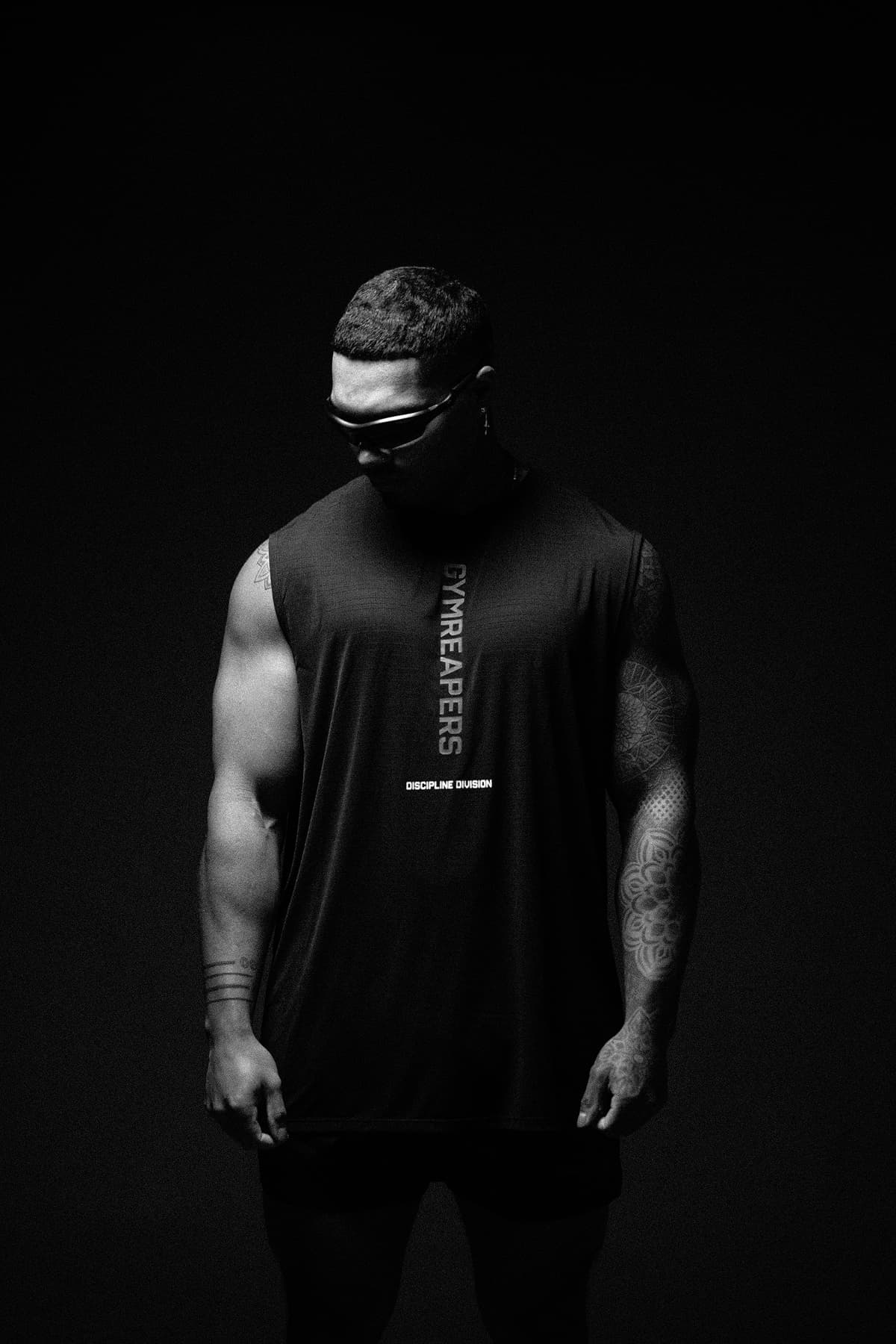
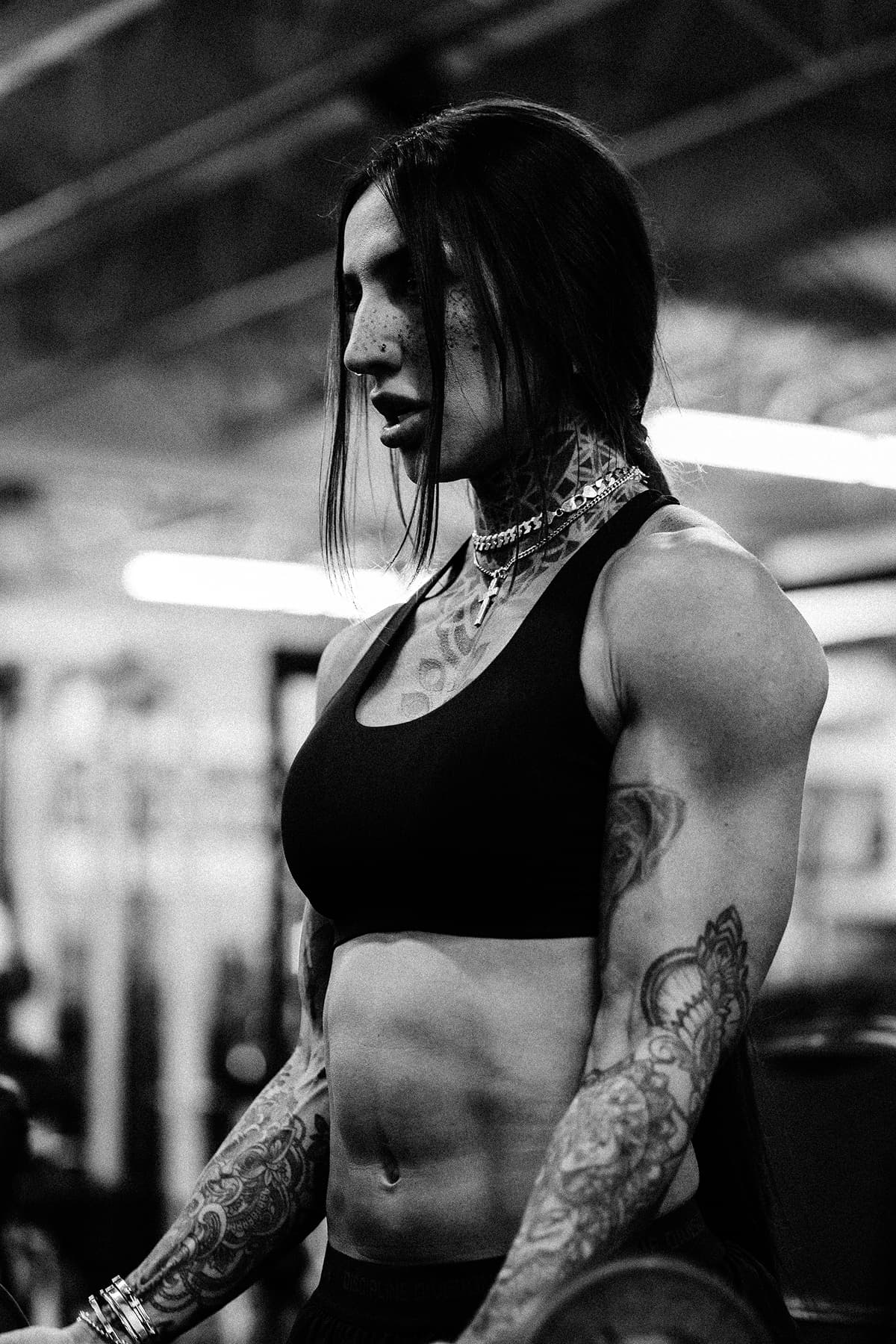
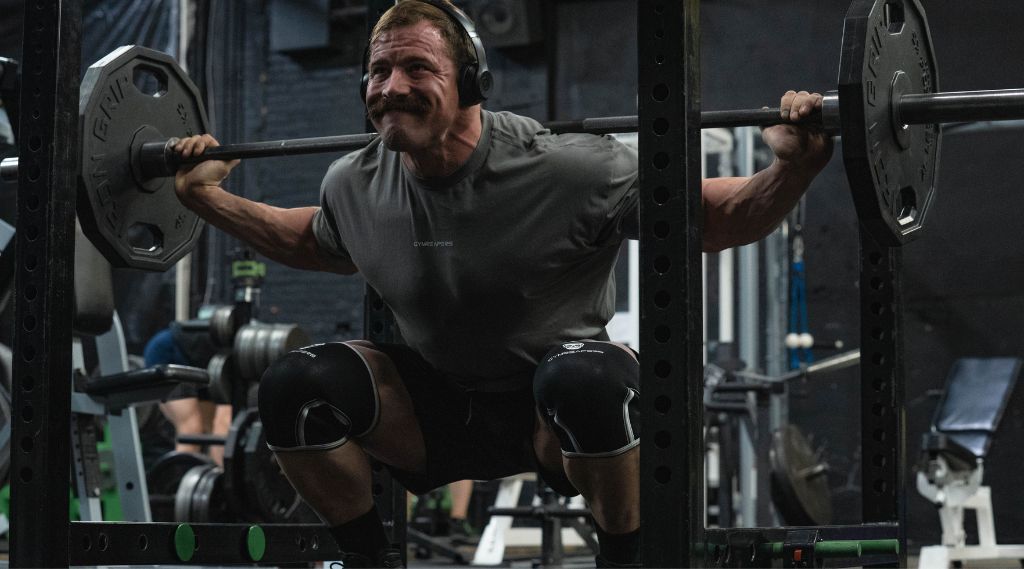
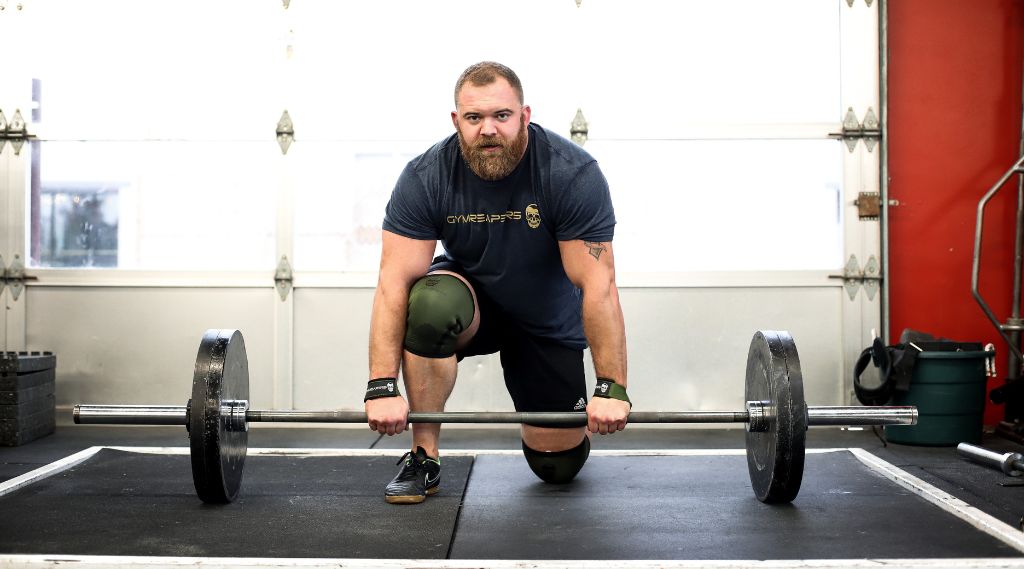
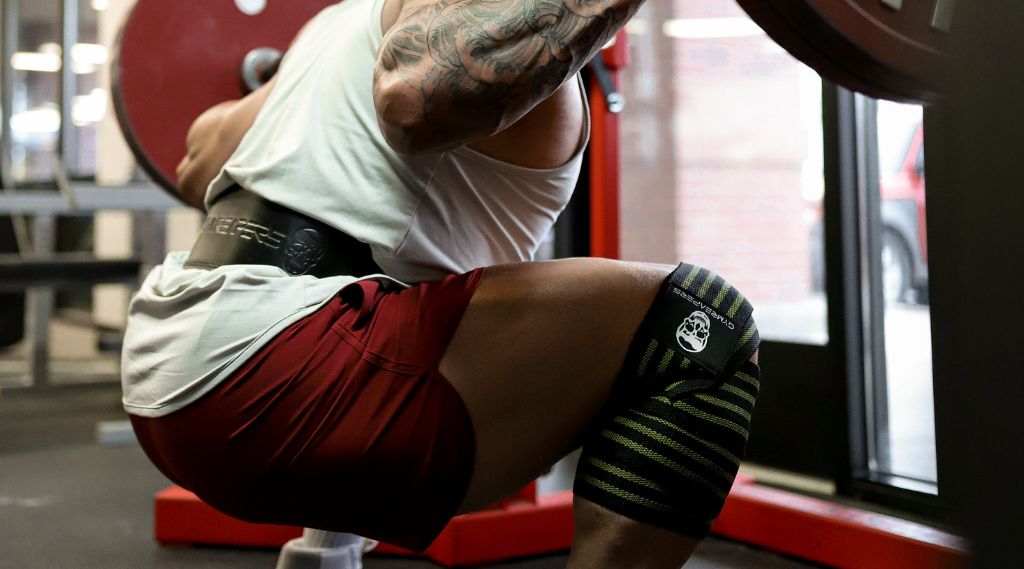
Leave a comment
All comments are moderated before being published.
This site is protected by hCaptcha and the hCaptcha Privacy Policy and Terms of Service apply.